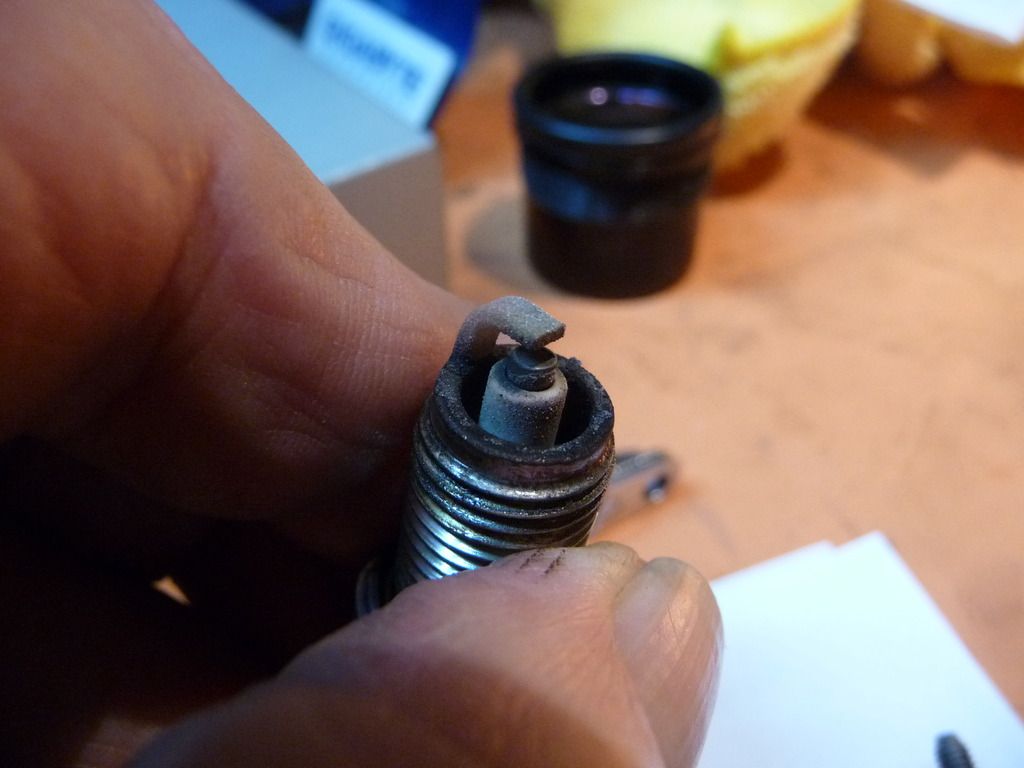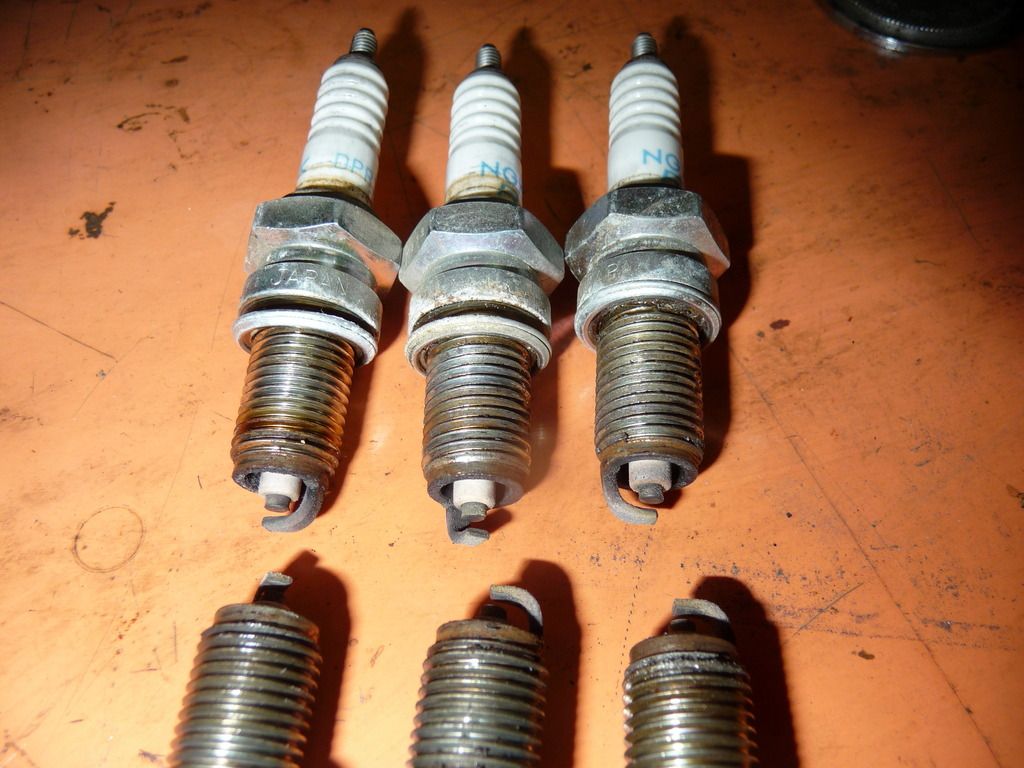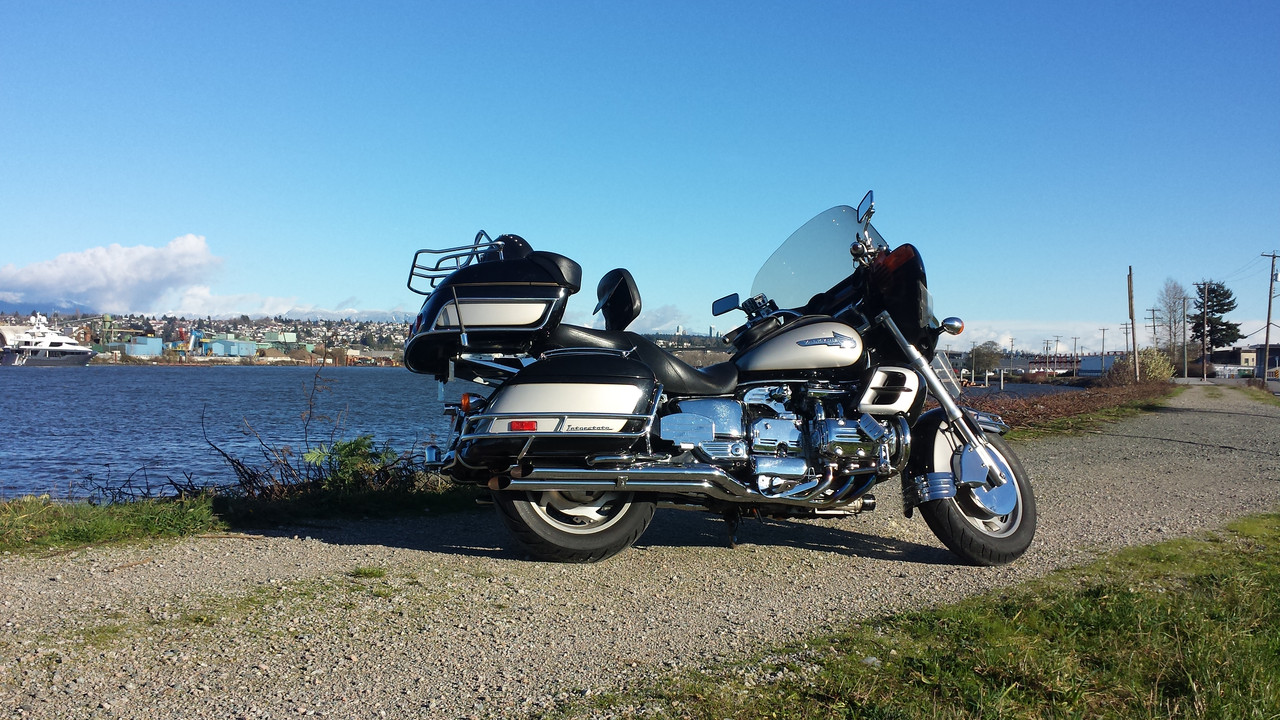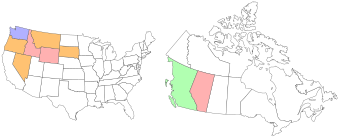|
Rio Wil
|
 |
« on: November 19, 2015, 07:03:20 PM » |
|
The phat lady is a constant source of amazement!! Below are two photos of spark plugs just removed from the Valk ( a plugectomy...  ). The plugs have 126K miles and I changed them simply out of guilt.....no power problems, no fuel mileage issue, no idle problems.....just sheer guilt. They have never been cleaned, matter of fact 5 of the 6 have not even been unscrewed in that time, I did remove one plug at about 60K miles just to see if they were frozen. You can see just a bit of never seize on the threads......worked good.. The plugs were gapped at .032 new and now are about .034-.035......  These are stock NGK DPR7EA 9 from O'Reileys Auto Parts for 2.49 each. The bike has 226K.....so I am happy with the plug color and condition.... Oh....the new plugs changed nothing......but I do feel better      |
|
|
|
« Last Edit: November 19, 2015, 07:22:28 PM by Rio Wil »
|
 Logged
Logged
|
|
|
|
|
Bone
|
 |
« Reply #1 on: November 20, 2015, 02:53:32 AM » |
|
Couldn't wait that long your strong. Unscrew mine each fall just so they will. I broke down at 70k and did the plugectomy.
Wonderful machines.
|
|
|
|
|
 Logged
Logged
|
|
|
|
|
Bagger John - #3785
|
 |
« Reply #2 on: November 20, 2015, 05:18:37 AM » |
|
Couldn't wait that long your strong. Unscrew mine each fall just so they will. I broke down at 70k and did the plugectomy.
Wonderful machines.
I do mine every fall when it goes into winter storage (so I can squirt a bit of oil into each cylinder) then check the gaps every spring when breaking the bikes out for the season. They get cleaned and a small dab of anti-seize applied to the threads. Used to change them every spring but that was with fewer bikes and a lot more accumulated miles per year. I may have re-gapped two plugs in five years. |
|
|
|
|
 Logged
Logged
|
|
|
|
|
Chrisj CMA
|
 |
« Reply #3 on: November 20, 2015, 03:20:35 PM » |
|
Sparkplugs
|
|
|
|
|
 Logged
Logged
|
|
|
|
Tfrank59
Member
    
Posts: 1364
'98 Tourer
Western Washington

|
 |
« Reply #4 on: November 21, 2015, 07:28:40 AM » |
|
Well I changed mine, along with many things when I first bought my bike, just to see what's going on in there (are they all tan, are the gaps correct, are the threads OK – put a little antiseize, etc). For those of us who purchased our Valk used, once you've change the plugs, you know what's in there and you know that item is good to go, then on to the next thing. For me, it's as basic as changing the oil in any new vehicle you buy.
|
|
|
|
|
 Logged
Logged
|
-Tom
Keep the rubber side down. USMC '78-'84
'98 Valkyrie, ‘02 VTX 1800, '96 Royal Star, '06 Drifter, '09 Bonneville, '10 KTM 530, '04 XR 650, '76 Bultaco, '81 CR 450, '78 GS 750...
|
|
|
h13man
Member
    
Posts: 1892
To everything there is an exception.
Indiana NW Central Flatlands
|
 |
« Reply #5 on: November 22, 2015, 09:16:19 AM » |
|
Recently changed mine do to one fouled out @ 9000 mi. Manual calls for 8000 mi. intervals. At $13 a set I guess I'll trust the manual recommendation.
|
|
|
|
|
 Logged
Logged
|
|
|
|
|
Chrisj CMA
|
 |
« Reply #6 on: November 22, 2015, 06:45:18 PM » |
|
Recently changed mine do to one fouled out @ 9000 mi. Manual calls for 8000 mi. intervals. At $13 a set I guess I'll trust the manual recommendation.
8,000 mi interval. No way, for the last 13 years I have been changing them every 50 to 60 k and they always look like new when I toss them in the trash. Something other than plug age/miles caused that fouling |
|
|
|
|
 Logged
Logged
|
|
|
|
|
CoachDoc
|
 |
« Reply #7 on: November 22, 2015, 11:35:52 PM » |
|
Changed mine at 50k.......went with the Iridium plugs from NGK. Definitely won't need to be changed again for the life of the bike or 100k, whichever comes first.....lol
|
|
|
|
|
 Logged
Logged
|
CoachDoc
'97 Valkyrie Standard
'05 Goldwing
'74 CB550K
|
|
|
|
skygog
|
 |
« Reply #8 on: November 23, 2015, 03:07:16 AM » |
|
I did not know they could be changed, thanks 103,000 now.
|
|
|
|
|
 Logged
Logged
|
|
|
|
|
Oldnick
|
 |
« Reply #9 on: November 23, 2015, 10:01:02 AM » |
|
To me it looks like why bother, except that for under $20 you have new plugs. They look very clean, but insulation can break down etc.
For me I would buy a new set, have them on me and replace if you get trouble.
OTOH, for the cost, just doi it qand keep the old ones in case....
I reckon it's amazing that the plugs look like that after so long.Creds to Honda, I guess.
Nick
|
|
|
|
« Last Edit: November 23, 2015, 10:02:59 AM by Oldnick »
|
 Logged
Logged
|
Nick
May God save us from believers!
|
|
|
Daniel Meyer
Member
    
Posts: 5493
Author. Adventurer. Electrician.
The State of confusion.

|
 |
« Reply #10 on: November 23, 2015, 10:42:26 AM » |
|
Honda would like you to change these plugs (or at least r&r) at the manual's recommended interval so those nice steel plug bases don't permanently mate themselves into your nice aluminum head...
Note, they are also resistor plugs which, if falling out of spec will effect timing even though they look okay. It's as easy to change them as check them.
I do mine about once a year...or so...sometimes...mostly.
|
|
|
|
|
 Logged
Logged
|
CUAgain, Daniel Meyer  |
|
|
|
Rio Wil
|
 |
« Reply #11 on: November 23, 2015, 07:33:19 PM » |
|
Changed mine at 50k.......went with the Iridium plugs from NGK. Definitely won't need to be changed again for the life of the bike or 100k, whichever comes first.....lol
So I wonder, do the makers of 100K plugs recommend they be removed ever so often to check for seizing up .....or do they rely on the plating on the plug to resist corrosion and seizing? The plugs in my F150 are supposed to be 100K plugs.....but that is another whole f'ed up story....stupid ass Ford engineering..     |
|
|
|
|
 Logged
Logged
|
|
|
|
|
98valk
|
 |
« Reply #12 on: November 25, 2015, 07:01:20 PM » |
|
NGK makes great plugs.
however looks of electrodes mean nothing. its all about the resistance of the resistor. new NGK plugs usually are about 4.5-4.7K ohms. if still in that range at 100+k miles, then they are well made plugs and live up to their rep.
case in point, I have a set of autolites installed. a few days ago it was very hard starting when cold and ran really rough, until some temp got into the cylinder then it ran and idled like nothing was wrong. well pulled some plugs, a few were 7k ohms and the others were still as when new at 3.5k ohms, these type have a reduced size center electrode.
When I install plugs I always check the ohms and write it down. in fact the set of autolites that I just took out, when I bought them, one plug was over 7k ohms and the rest were 3.5k range. had to go buy another one.
|
|
|
|
|
 Logged
Logged
|
1998 Std/Tourer, 2007 DR200SE, 1981 CB900C 10speed
1973 Duster 340 4-speed rare A/C, 2001 F250 4x4 7.3L, 6sp
"Our Constitution was made only for a Moral and Religious people. It is wholly inadequate to the goverment of any other."
John Adams 10/11/1798
|
|
|
gordonv
Member
    
Posts: 5766
VRCC # 31419
Richmond BC
|
 |
« Reply #13 on: November 26, 2015, 08:02:09 PM » |
|
I know almost nothing about plugs other than they come with a resistance.
You actually know what the resistance should be, and you measure them up before installing, so you have a match set? Does it actually matter or do anything? ???
Now with the Iridium plugs I'll be installing in the spring, the tips are made from a material that supposedly withstands the arch of the spark without wearing down. Therefore the gape and the sharp edges of the electrode stay intact (the spark likes the sharp edges to jump to, that's why regular electrodes round out from use). I think I'll also try this measuring of the resistance if I remember, and record each plug and the cylinder they go into.
|
|
|
|
« Last Edit: November 26, 2015, 08:08:17 PM by gordonv »
|
 Logged
Logged
|
1999 Black with custom paint IS   |
|
|
|
jdp
|
 |
« Reply #14 on: November 30, 2015, 07:23:48 PM » |
|
Man these bikes are the best,everyday I hear something amazing about them,we sure are lucky to have one.
|
|
|
|
|
 Logged
Logged
|
|
|
|
nogrey
Member
    
Posts: 939
Live every day as if it were your last
Nampa, Idaho

|
 |
« Reply #15 on: December 01, 2015, 05:22:05 PM » |
|
I know almost nothing about plugs other than they come with a resistance.
You actually know what the resistance should be, and you measure them up before installing, so you have a match set? Does it actually matter or do anything? ???
Now with the Iridium plugs I'll be installing in the spring, the tips are made from a material that supposedly withstands the arch of the spark without wearing down. Therefore the gape and the sharp edges of the electrode stay intact (the spark likes the sharp edges to jump to, that's why regular electrodes round out from use). I think I'll also try this measuring of the resistance if I remember, and record each plug and the cylinder they go into.
That's interesting stuff there. I just received a set of iridium plugs that I ordered a few days ago. I'll measure mine before putting them in and we can maybe compare notes? Might be good information to keep in the valk book. Sure can't hurt. Anyway, interesting theory. I noticed that the iridiums I received have very small electrodes that come to a very sharp point. |
|
|
|
|
 Logged
Logged
|
|
|
|
gordonv
Member
    
Posts: 5766
VRCC # 31419
Richmond BC
|
 |
« Reply #16 on: December 01, 2015, 08:49:14 PM » |
|
I noticed that the iridiums I received have very small electrodes that come to a very sharp point.
If I have it right, and the sharp edge is where the spark goes. Then the iridium is strong enough to stand up to the arch. There is no reason for anything more, as that edge will not wear away. I remember reading NOT to check your gape (do it VERY carefully), as it is also very brittle, and can break if you try to force a gauge in there. Use the electrode bender to adjust the gape. So knowing that, do it very carefully. I keep a little note.txt in my service/motorcycle folder, and record everything I do to my bike, along with notes of interest (Valk rim compatibility, oil filter, tire size, spark plug, etc. etc.). |
|
|
|
|
 Logged
Logged
|
1999 Black with custom paint IS   |
|
|
|
|
|
98valk
|
 |
« Reply #18 on: December 02, 2015, 05:53:22 AM » |
|
|
|
|
|
|
 Logged
Logged
|
1998 Std/Tourer, 2007 DR200SE, 1981 CB900C 10speed
1973 Duster 340 4-speed rare A/C, 2001 F250 4x4 7.3L, 6sp
"Our Constitution was made only for a Moral and Religious people. It is wholly inadequate to the goverment of any other."
John Adams 10/11/1798
|
|
|
O-B-1
Member
    
Posts: 222
Show ain't over until the Fat Lady sings
Vancouver, WA

|
 |
« Reply #19 on: December 02, 2015, 05:46:24 PM » |
|
case in point, I have a set of autolites installed. a few days ago it was very hard starting when cold and ran really rough, until some temp got into the cylinder then it ran and idled like nothing was wrong. well pulled some plugs, a few were 7k ohms and the others were still as when new at 3.5k ohms, these type have a reduced size center electrode.
When I install plugs I always check the ohms and write it down. in fact the set of autolites that I just took out, when I bought them, one plug was over 7k ohms and the rest were 3.5k range. had to go buy another one.
A friend of mine is an auto mechanic by profession. He said it was best if I avoided Autolites altogether due to quality issues. He said to get NGK's, even for the 1977 Chevy C20 Crew Cab I just stuffed a 1988 GMC 305 TBI & HD Turbo 400 into. |
|
|
|
|
 Logged
Logged
|
David W. Mitchell
1999 Honda Valkyrie GL1500C
|
|
|
|
98valk
|
 |
« Reply #20 on: December 02, 2015, 06:22:56 PM » |
|
case in point, I have a set of autolites installed. a few days ago it was very hard starting when cold and ran really rough, until some temp got into the cylinder then it ran and idled like nothing was wrong. well pulled some plugs, a few were 7k ohms and the others were still as when new at 3.5k ohms, these type have a reduced size center electrode.
When I install plugs I always check the ohms and write it down. in fact the set of autolites that I just took out, when I bought them, one plug was over 7k ohms and the rest were 3.5k range. had to go buy another one.
A friend of mine is an auto mechanic by profession. He said it was best if I avoided Autolites altogether due to quality issues. He said to get NGK's, even for the 1977 Chevy C20 Crew Cab I just stuffed a 1988 GMC 305 TBI & HD Turbo 400 into. these are the ones I use auto lite 4164 which has a necked down center electrode and then mod the side electrode. http://www.sparkplugs.com/product.aspx?zpid=777611. N ECKED DOWN CENTER ELECTRODE Tapered high nickel-chrome alloy tip combined with copper center electrode produces hotter, sharper spark for easier starting and on-road performance. any specilaty plug, platimun, Iridium, etc., only work because other parts of the ignition system are weak. (The valkyrie ignition is a weak system as stated by Dyna ignition). This is in Dr jacobs book. those exotic metals have very high resistance, hence why the center electrode has to be so small. hotter coils, better wires are the answer and modified plugs, which I do for all my vehicles. I was using a set of coils from a blackbird, quicker accel, but they would burn out the dyna ignition, so back to stock now. They wouldn't hurt the stock ICMs. Also measure the ohm resistance btwn plug brands, they are all different. http://www.musclemustangfastfords.com/tech/0207mmff_tech/index.html by David Vizard tells why the plug mod works. |
|
|
|
|
 Logged
Logged
|
1998 Std/Tourer, 2007 DR200SE, 1981 CB900C 10speed
1973 Duster 340 4-speed rare A/C, 2001 F250 4x4 7.3L, 6sp
"Our Constitution was made only for a Moral and Religious people. It is wholly inadequate to the goverment of any other."
John Adams 10/11/1798
|
|
|
nogrey
Member
    
Posts: 939
Live every day as if it were your last
Nampa, Idaho

|
 |
« Reply #21 on: December 04, 2015, 01:16:37 PM » |
|
I measured my Iridium NGK's that I received yesterday before putting them in. They were all 5.1 to 6.1 ohms. NGK DPR7EIX-9 Another thing worth mentioning: I was reading some older threads and they all talked about things like using anti-seize, copper, zinc, nickel, aluminum etc. I think the bottom line was to use whatever you have but use it. The other thing mentioned was how to properly seat the plug, which had all sorts of variations of opinions. None of them mentioned the one that actually came on the NGK spark plug box that I received my plugs (not the individual box, but the outer box that held 4 plugs). It had a pictorial diagram indicating that the plug should be threaded in by hand until seated, and then tightened 1/4 more turn. Much the way one installs an oil filter. This eliminates the concern for over-torquing due to the use of anti-seize. I started it up after installing them and the bike took off so fast that it was just a red blur. (Ok, that last part isn't really true)  |
|
|
|
« Last Edit: December 04, 2015, 01:33:05 PM by nogrey »
|
 Logged
Logged
|
|
|
|
|

